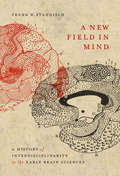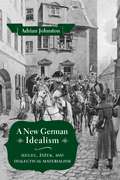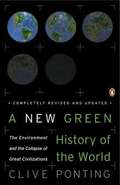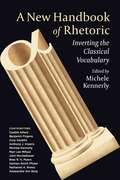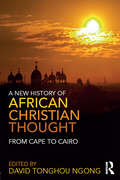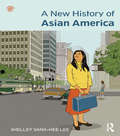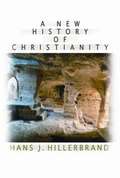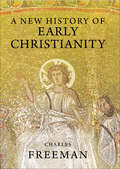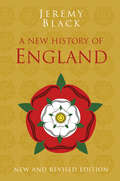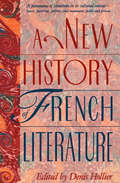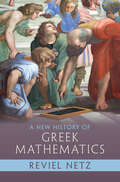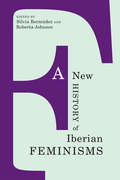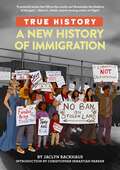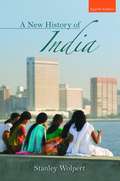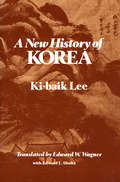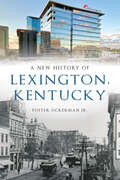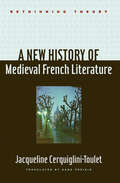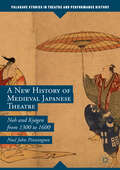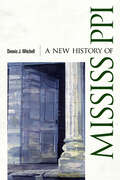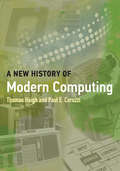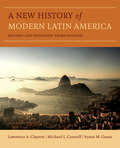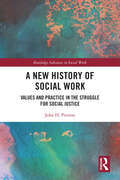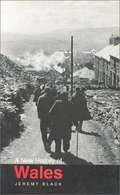- Table View
- List View
A New Field in Mind: A History of Interdisciplinarity in the Early Brain Sciences (McGill-Queen's/Associated Medical Services Studies in the History of Medicine, Health, and Society #52)
by Frank W. StahnischIn recent decades, developments in research technologies and therapeutic advances have generated immense public recognition for neuroscience. However, its origins as a field, often linked to partnerships and projects at various brain-focused research centres in the United States during the 1960s, can be traced much further back in time. In A New Field in Mind Frank Stahnisch documents and analyzes the antecedents of the modern neurosciences as an interdisciplinary field. Although postwar American research centres, such as Francis O. Schmitt's Neuroscience Research Program at MIT, brought the modern field to prominence, Stahnisch reveals the pioneering collaborations in the early brain sciences at centres in Germany, Austria, and Switzerland in the first half of the twentieth century. One of these, Heinrich Obersteiner's institute in Vienna, began its work in the 1880s. Through case studies and collective biographies, Stahnisch investigates the evolving relationships between disciplines – anatomy, neurology, psychiatry, physiology, serology, and neurosurgery – which created new epistemological and social contexts for brain research. He also shows how changing political conditions in Central Europe affected the development of the neurosciences, ultimately leading to the expulsion of many physicians and researchers under the Nazi regime and their migration to North America. An in-depth and innovative study, A New Field in Mind tracks the emergence and evolution of neuroscientific research from the late nineteenth century to the postwar period.
A New German Idealism: Hegel, Žižek, and Dialectical Materialism
by Adrian JohnstonIn 2012, philosopher and public intellectual Slavoj Žižek published what arguably is his magnum opus, the one-thousand-page tome Less Than Nothing: Hegel and the Shadow of Dialectical Materialism. A sizable sequel appeared in 2014, Absolute Recoil: Towards a New Foundation of Dialectical Materialism. In these two books, Žižek returns to the German idealist G. W. F. Hegel in order to forge a new materialism for the twenty-first century. Žižek’s reinvention of Hegelian dialectics explores perennial and contemporary concerns: humanity’s relations with nature, the place of human freedom, the limits of rationality, the roles of spirituality and religion, and the prospects for radical sociopolitical change.In A New German Idealism, Adrian Johnston offers a first-of-its-kind sustained critical response to Less Than Nothing and Absolute Recoil. Johnston, a leading authority on and interlocutor of Žižek, assesses the recent return to Hegel against the backdrop of Kantian and post-Kantian German idealism. He also presents alternate reconstructions of Hegel’s positions that differ in important respects from Žižek’s version of dialectical materialism. In particular, Johnston criticizes Žižek’s deviations from the secular naturalism and Enlightenment optimism of his chosen sources of inspiration: not only Hegel, but Karl Marx and Sigmund Freud too. In response, Johnston develops what he calls transcendental materialism, an antireductive and leftist materialism capable of preserving and advancing the core legacies of the Hegelian, Marxian, and Freudian traditions central to Žižek.
A New Green History Of The World: The Environment And The Collapse Of Great Civilizations
by Clive PontingClive Ponting's original and provocative history of human civilization - now in a thoroughly revised, expanded, and updated edition. Years ahead of its time, Clive Ponting captivated readers with A Green History of the World, his study of great civilizations and the causes of their fall. Using the Roman empire as its central example, this classic work reveals how overexpansion and the exhaustion of available natural resources have played key roles in the collapse of all great cultures in human history. With an argument of urgent relevance to our modern society, A Green History of the World offers a provocative and illuminating view of human history and its relationship to the environment.
A New Handbook of Rhetoric: Inverting the Classical Vocabulary
by Michele KennerlyLike every discipline, Rhetorical Studies relies on a technical vocabulary to convey specialized concepts, but few disciplines rely so deeply on a set of terms developed so long ago. Pathos, kairos, doxa, topos—these and others originate from the so-called classical world, which has conferred on them excessive authority. Without jettisoning these rhetorical terms altogether, this handbook addresses critiques of their ongoing relevance, explanatory power, and exclusionary effects.A New Handbook of Rhetoric inverts the terms of classical rhetoric by applying to them the alpha privative, a prefix that expresses absence. Adding the prefix α- to more than a dozen of the most important terms in the field, the contributors to this volume build a new vocabulary for rhetorical inquiry. Essays on apathy, akairos, adoxa, and atopos, among others, explore long-standing disciplinary habits, reveal the denials and privileges inherent in traditional rhetorical inquiry, and theorize new problems and methods. Using this vocabulary in an analysis of current politics, media, and technology, the essays illuminate aspects of contemporary culture that traditional rhetorical theory often overlooks.Innovative and groundbreaking, A New Handbook of Rhetoric at once draws on and unsettles ancient Greek rhetorical terms, opening new avenues for studying values, norms, and phenomena often stymied by the tradition.In addition to the editor, the contributors include Caddie Alford, Benjamin Firgens, Cory Geraths, Anthony J. Irizarry, Mari Lee Mifsud, John Muckelbauer, Bess R. H. Myers, Damien Smith Pfister, Nathaniel A. Rivers, and Alessandra Von Burg.
A New Handbook of Rhetoric: Inverting the Classical Vocabulary
by Michele KennerlyLike every discipline, Rhetorical Studies relies on a technical vocabulary to convey specialized concepts, but few disciplines rely so deeply on a set of terms developed so long ago. Pathos, kairos, doxa, topos—these and others originate from the so-called classical world, which has conferred on them excessive authority. Without jettisoning these rhetorical terms altogether, this handbook addresses critiques of their ongoing relevance, explanatory power, and exclusionary effects.A New Handbook of Rhetoric inverts the terms of classical rhetoric by applying to them the alpha privative, a prefix that expresses absence. Adding the prefix α- to more than a dozen of the most important terms in the field, the contributors to this volume build a new vocabulary for rhetorical inquiry. Essays on apathy, akairos, adoxa, and atopos, among others, explore long-standing disciplinary habits, reveal the denials and privileges inherent in traditional rhetorical inquiry, and theorize new problems and methods. Using this vocabulary in an analysis of current politics, media, and technology, the essays illuminate aspects of contemporary culture that traditional rhetorical theory often overlooks.Innovative and groundbreaking, A New Handbook of Rhetoric at once draws on and unsettles ancient Greek rhetorical terms, opening new avenues for studying values, norms, and phenomena often stymied by the tradition.In addition to the editor, the contributors include Caddie Alford, Benjamin Firgens, Cory Geraths, Anthony J. Irizarry, Mari Lee Mifsud, John Muckelbauer, Bess R. H. Myers, Damien Smith Pfister, Nathaniel A. Rivers, and Alessandra Von Burg.
A New History of African Christian Thought: From Cape to Cairo
by David Tonghou NgongDavid Tonghou Ngong offers a comprehensive view of African Christian thought that includes North Africa in antiquity as well as Sub-Saharan Africa from the period of colonial missionary activity to the present. Challenging conventional colonial divisions of Africa, A New History of African Christian Thought demonstrates that important continuities exist across the continent. Chapters written by specialists in African Christian thought reflect the issues—both ancient and modern—in which Christian Africa has impacted the shape of Christian belief from the beginning of the movement up to the present day.
A New History of Asian America
by Shelley Sang-Hee LeeA New History of Asian America is a fresh and up-to-date history of Asians in the United States from the late eighteenth century to the present. Drawing on current scholarship, Shelley Lee brings forward the many strands of Asian American history, highlighting the distinctive nature of the Asian American experience while placing the narrative in the context of the major trajectories and turning points of U.S. history. Covering the history of Filipinos, Koreans, Asian Indians, and Southeast Indians as well as Chinese and Japanese, the book gives full attention to the diversity within Asian America. A robust companion website features additional resources for students, including primary documents, a timeline, links, videos, and an image gallery. From the building of the transcontinental railroad to the celebrity of Jeremy Lin, people of Asian descent have been involved in and affected by the history of America. A New History of Asian America gives twenty-first-century students a clear, comprehensive, and contemporary introduction to this vital history.
A New History of Christianity
by Hans J. HillerbrandThis book is a history of Christianity from its earliest beginnings to the end of the twentieth century. The book provides students with an introduction to the many persons, places, movements, and events necessary for the telling of our story, the story of the Church. This history of Christianity is told in its essentials, simply and straightforwardly for students with little or no experience in the academic study of religion. It is a story told within the complex contexts of larger world events and world cultures, but defined and simplified by attention to those developments which have proven most influential for the past and present shaping of Church thought and practice. The book is a comprehensive and definitive introduction to the history of Christianity. It provides students with the necessary outline and description of the broad sweep of movements and periods in this history, but it also pauses at important points to provide details about the lives of Christians as lived at various times and in various locations. This story is told in easy-to-understand prose and with illustrative photographs, maps and charts.
A New History of Early Christianity
by Charles FreemanThe relevance of Christianity is as hotly contested today as it has ever been. A New History of Early Christianityshows how our current debates are rooted in the many controversies surrounding the birth of the religion and the earliest attempts to resolve them. Charles Freeman's meticulous historical account of Christianity from its birth in Judaea in the first century A. D. to the emergence of Western and Eastern churches by A. D. 600 reveals that it was a distinctive, vibrant, and incredibly diverse movement brought into order at the cost of intellectual and spiritual vitality. Against the conventional narrative of the inevitable "triumph" of a single distinct Christianity, Freeman shows that there was a host of competing Christianities, many of which had as much claim to authenticity as those that eventually dominated. Looking with fresh eyes at the historical record, Freeman explores the ambiguities and contradictions that underlay Christian theology and the unavoidable compromises enforced in the name of doctrine. Tracing the astonishing transformation that the early Christian church underwent--from sporadic niches of Christian communities surviving in the wake of a horrific crucifixion to sanctioned alliance with the state--Charles Freeman shows how freedom of thought was curtailed by the development of the concept of faith. The imposition of "correct belief," religious uniformity, and an institutional framework that enforced orthodoxy were both consolidating and stifling. Uncovering the difficulties in establishing the Christian church, he examines its relationship with Judaism, Gnosticism, Greek philosophy and Greco-Roman society, and he offers dramatic new accounts of Paul, the resurrection, and the church fathers and emperors.
A New History of England (Classic Histories Series)
by Jeremy BlackIn this new and updated edition of A New History of England, historian Jeremy Black takes a cool and dispassionate look at the vicissitudes of over two millennia of English history. He identifies two central themes: the lack of geographical and economic uniformity within England; and the fact that, from the Roman invasion onwards, a united England was often politically associated with part of Europe, from the Scandinavian Cnut to the German origins of the Hanoverians and their descendants. Professor Black steers his way through the labyrinthine complexities of historical narrative with elegance and clarity, providing a lively analysis of major events and personalities and important underlying themes, taking his account right up to the Brexit controversy.
A New History of French Literature
by Barbara Johnson R. Howard Bloch Peter Brooks Nancy K. Miller Joan DeJean Nancy J. Vickers Denis Hollier Philip E. Lewis François RigolotDesigned for the general reader, this splendid introduction to French literature from 842 A.D.—the date of the earliest surviving document in any Romance language—to the present decade is the most compact and imaginative single-volume guide available in English to the French literary tradition. In fact, no comparable work exists in either language. It is not the customary inventory of authors and titles but rather a collection of wide-angled views of historical and cultural phenomena. It sets before us writers, public figures, criminals, saints, and monarchs, as well as religious, cultural, and social revolutions. It gives us books, paintings, public monuments, even TV shows. Written by 164 American and European specialists, the essays are introduced by date and arranged in chronological order, but here ends the book’s resemblance to the usual history of literature. Each date is followed by a headline evoking an event that indicates the chronological point of departure. Usually the event is literary—the publication of an original work, a journal, a translation, the first performance of a play, the death of an author—but some events are literary only in terms of their repercussions and resonances. Essays devoted to a genre exist alongside essays devoted to one book, institutions are presented side by side with literary movements, and large surveys appear next to detailed discussions of specific landmarks. No article is limited to the “life and works” of a single author. Proust, for example, appears through various lenses: fleetingly, in 1701, apropos of Antoine Galland’s translation of The Thousand and One Nights; in 1898, in connection with the Dreyfus Affair; in 1905, on the occasion of the law on the separation of church and state; in 1911, in relation to Gide and their different treatments of homosexuality; and at his death in 1922. Without attempting to cover every author, work, and cultural development since the Serments de Strasbourg in 842, this history succeeds in being both informative and critical about the more than 1,000 years it describes. The contributors offer us a chance to appreciate not only French culture but also the major critical positions in literary studies today. A New History of French Literature will be essential reading for all engaged in the study of French culture and for all who are interested in it. It is an authoritative, lively, and readable volume.
A New History of Greek Mathematics
by Reviel NetzThe ancient Greeks played a fundamental role in the history of mathematics and their ideas were reused and developed in subsequent periods all the way down to the scientific revolution and beyond. In this, the first complete history for a century. Reviel Netz offers a panoramic view of the rise and influence of Greek mathematics and its significance in world history. He explores the Near Eastern antecedents and the social and intellectual developments underlying the subject's beginnings in Greece in the fifth century BCE. He leads the reader through the proofs and arguments of key figures like Archytas, Euclid and Archimedes, and considers the totality of the Greek mathematical achievement which also includes, in addition to pure mathematics, such applied fields as optics, music, mechanics and, above all, astronomy. This is the story not only of a major historical development, but of some of the finest mathematics ever created.
A New History of Iberian Feminisms (Toronto Iberic)
by Silvia Bermudez Roberta JohnsonA New History of Iberian Feminisms is both a chronological history and an analytical discussion of feminist thought in the Iberian Peninsula, including Portugal, and the territories of Spain – the Basque Provinces, Catalonia, and Galicia – from the eighteenth century to the present day. The Iberian Peninsula encompasses a dynamic and fraught history of feminism that had to contend with entrenched tradition and a dominant Catholic Church. Editors Silvia Bermúdez and Roberta Johnson and their contributors reveal the long and historical struggles of women living within various parts of the Iberian Peninsula to achieve full citizenship. A New History of Iberian Feminisms comprises a great deal of new scholarship, including nineteenth-century essays written by women on the topic of equality. By addressing these lost texts of feminist thought, Bermúdez, Johnson, and their contributors reveal that female equality, considered a dormant topic in the early nineteenth century, was very much part of the political conversation, and helped to launch the new feminist wave in the second half of the century.
A New History of Immigration (True History)
by Jaclyn Backhaus&“A powerful series that fills in the cracks and illuminates the shadows of the past.&” –Sherri L. Smith, award-winning author of Flygirl Introducing a new nonfiction series that uncovers hidden histories of the United States.The true story of a nation of immigrants and its dreamers. The United States has long been touted as a place where anyone with a little grit and determination could come to pursue the American Dream. But as more walls are erected and borders are closed, is that dream still alive today? Complete with an 8-page color photo insert, A New History of Immigration introduces young readers to alternative histories of immigration beyond Ellis Island and amplifies the voices of marginalized immigrants and their stories of success.
A New History of India
by Stanley WolpertAfter more than twenty-five years in print, A New History of India continues to be the most readable and popular one-volume history of India available. Now in its eighth edition, this acclaimed text features updated scholarship and bibliographic material throughout and integrates new research on such incisive topics as the Indian diaspora, the economy, and the nuclear issue. In lively, accessible language, Stanley Wolpert condenses more than 4,000 years of India's history into a graceful and engaging narrative. He discusses modern India's rapidly growing population, industry, and economy, and also considers the prospects for India's future. From a carefully balanced perspective, Wolpert presents a fair and truthful record of India's history--he offers both a triumphant portrayal of the brightest achievements of Indian civilization as well as a sobering examination of its persistent social inequities and economic and political corruption. Enhanced with striking new images and a full-color map of India and the surrounding area, A New History of India, Eighth Edition, remains the authoritative text on the compelling--and often controversial--history of this fascinating country.
A New History of Korea (Harvard-yenching Institute Publications)
by Ki-Baik LeeThe first English-language history of Korea to appear in more than a decade, this translation offers Western readers a distillation of the latest and best scholarship on Korean history and culture from the earliest times to the student revolution of 1960. The most widely read and respected general history, A New History of Korea (Han’guksa sillon) was first published in 1961 and has undergone two major revisions and updatings. <P><P> Translated twice into Japanese and currently being translated into Chinese as well, Ki-baik Lee’s work presents a new periodization of his country’s history, based on a fresh analysis of the changing composition of the leadership elite. The book is noteworthy, too, for its full and integrated discussion of major currents in Korea’s cultural history. The translation, three years in preparation, has been done by specialists in the field.
A New History of Lexington, Kentucky (Brief History)
by Foster Ockerman Jr.Lexington is known as the "Horse Capital of the World," but the city's history runs much deeper. Learn about the mayor who refused the Ku Klux Klan permission to march and organize in the city. Meet one of the nation's foremost advocates for voting rights for women who was a native of the city. Visit the many small hamlets around Lexington that were settlements for the formerly enslaved. Lexington was the state's first capital and the nation's first community to establish an urban service boundary to regulate growth and preserve horse farms. Seventh-generation Kentuckian and Lexington native Foster Ockerman Jr. offers an updated history.
A New History of Medieval French Literature (Rethinking Theory)
by Jacqueline Cerquiglini-TouletIs it legitimate to conceive of and write a history of medieval French literature when the term "literature" as we know it today did not appear until the very end of the Middle Ages? In this novel introduction to French literature of the period, Jacqueline Cerquiglini-Toulet says yes, arguing that a profound literary consciousness did exist at the time.Cerquiglini-Toulet challenges the standard ways of reading and evaluating literature, considering medieval literature not as separate from that in other eras but as part of the broader tradition of world literature. Her vast and learned readings of both canonical and lesser-known works pose crucial questions about, among other things, the notion of otherness, the meaning of change and stability, and the relationship of medieval literature with theology. Part history of literature, part theoretical criticism, this book reshapes the language and content of medieval works. By weaving together topics such as the origin of epic and lyric poetry, Latin-French bilingualism, women’s writing, grammar, authorship, and more, Cerquiglini-Toulet does nothing less than redefine both philosophical and literary approaches to medieval French literature. Her book is a history of the literary act, a history of words, a history of ideas and works—monuments rather than documents—that calls into question modern concepts of literature.
A New History of Medieval Japanese Theatre: Noh and Kyōgen from 1300 to 1600 (Palgrave Studies in Theatre and Performance History)
by Noel John PinningtonThis book traces the history of noh and kyōgen, the first major Japanese theatrical arts. Going beyond P. G. O'Neill's Early Nō Drama of 1958, it covers the full period of noh's medieval development and includes a chapter dedicated to the comic art of kyōgen, which has often been left in noh's shadow. It is based on contemporary research in Japan, Asia, Europe and America, and embraces current ideas of theatre history, providing a richly contextualized account which looks closely at theatrical forms and genres as they arose. The masked drama of noh, with its ghosts, chanting and music, and its use in Japanese films, has been the object of modern international interest. However, audiences are often confused as to what noh actually is. This book attempts to answer where noh came from, what it was like in its day, and what it was for. To that end, it contains sections which discuss a number of prominent noh plays in their period and challenges established approaches. It also contains the first detailed study in English of the kyōgen repertoire of the sixteenth-century.
A New History of Mississippi
by Dennis J. MitchellCreating the first comprehensive narrative of Mississippi since the bicentennial history was published in 1976, Dennis J. Mitchell recounts the vibrant and turbulent history of a Deep South state. The author has condensed the massive scholarship produced since that time into an appealing narrative, which incorporates people missing from many previous histories including American Indians, women, African Americans, and a diversity of other minority groups. This is the story of a place and its people, history makers and ordinary citizens alike. Mississippi's rich flora and fauna are also central to the story, which follows both natural and man-made destruction and the major efforts to restore and defend rare untouched areas. Hernando De Soto, Sieur d’Iberville, Ferdinand Claiborne, Thomas Hinds, Aaron Burr, Greenwood LeFlore, Joseph Davis, Nathan Bedford Forrest, James D. Lynch, James K. Vardaman, Mary Grace Quackenbos, Ida B. Wells, William Alexander Percy, William Faulkner, Eudora Welty, Muddy Waters, B.B. King, Elvis Presley, John Grisham, Jack Reed, William F. Winter, Jim Barksdale, Richard Howorth, Christopher Epps, and too many more to list—this book covers a vast and rich legacy. From the rise and fall of American Indian culture to the advent of Mississippi’s world-renowned literary, artistic, and scientific contributions, Mitchell vividly brings to life the individuals and institutions that have created a fascinating and diverse state.
A New History of Modern Computing (History of Computing)
by Paul E. Ceruzzi Thomas HaighHow the computer became universal.Over the past fifty years, the computer has been transformed from a hulking scientific supertool and data processing workhorse, remote from the experiences of ordinary people, to a diverse family of devices that billions rely on to play games, shop, stream music and movies, communicate, and count their steps. In A New History of Modern Computing, Thomas Haigh and Paul Ceruzzi trace these changes. A comprehensive reimagining of Ceruzzi's A History of Modern Computing, this new volume uses each chapter to recount one such transformation, describing how a particular community of users and producers remade the computer into something new. Haigh and Ceruzzi ground their accounts of these computing revolutions in the longer and deeper history of computing technology. They begin with the story of the 1945 ENIAC computer, which introduced the vocabulary of "programs" and "programming," and proceed through email, pocket calculators, personal computers, the World Wide Web, videogames, smart phones, and our current world of computers everywhere--in phones, cars, appliances, watches, and more. Finally, they consider the Tesla Model S as an object that simultaneously embodies many strands of computing.
A New History of Modern Latin America
by Lawrence A. Clayton Michael L. Conniff Susan M. GaussA New History of Modern Latin America provides an engaging and readable narrative history of the nations of Latin America from the Wars of Independence in the nineteenth century to the democratic turn in the twenty-first. This new edition of a well-known text has been revised and updated to include the most recent interpretations of major themes in the economic, social, and cultural history of the region to show the unity of the Latin America experience while exploring the diversity of the region’s geography, peoples, and cultures. It also presents substantial new material on women, gender, and race in the region. Each chapter begins with primary documents, offering glimpses into moments in history and setting the scene for the chapter, and concludes with timelines and key words to reinforce content. Discussion questions are included to help students with research assignments and papers. Both professors and students will find its narrative, chronological approach a useful guide to the history of this important area of the world.
A New History of Social Work: Values and Practice in the Struggle for Social Justice (Routledge Advances in Social Work)
by John H. PiersonThis book provides an overview of the main developments in social work over its 200-year history. From its beginnings in the early 19th century through to the present day, it recounts the efforts to create a fairer, socially just society through its work with individuals and families. Throughout, by focusing on individual cases as well as major ideas behind practice, this book invites the reader to step into the practitioner’s world as it unfolded. Providing a fresh, critical history of social work in Britain, the book covers the practical assistance for families and individuals in poverty in the 19th century; women’s social work with destitute mothers and children; social work’s response to war time needs; the development of specific domains of social work such as hospital social work, psychiatric social workers, moral welfare and children in care; tackling racism; and social work in a market society. The reader encounters the society that social workers and their users wrote about, thought about and sought to create. Covering critical points of dispute along with overarching visions that would take the profession – and society – forward, the book explores the ideologies, moral constructs and social forces that shaped everyday social work. A New History of Social Work will be of interest to all scholars and students of social work and will be particularly relevant for modules on introductions to social work and the foundations of social work.
A New History of Wales
by Jeremy BlackJeremy Black outlines the history of Wales from its visitation by Neanderthal hunters through the first meeting of an assembly for Wales in 1999. He describes with names of specific people and places how Wales' organization and disorganization evolved through the centuries. He shows how its geography, mostly stony mountains which can't be farmed, small, fertile areas and coastline, contributed to the character of this small country. He explains the impact of castles, commerce, and the changing politics of surrounding nations on Welsh history. The contributions of the general population and moneyed classes are also covered as well as the industrial revolution and the persistent voice of the laborers and nonconformists. Unusual Welsh spellings and accents have been checked and a list of further reading and an index have been included at the end of the text.
